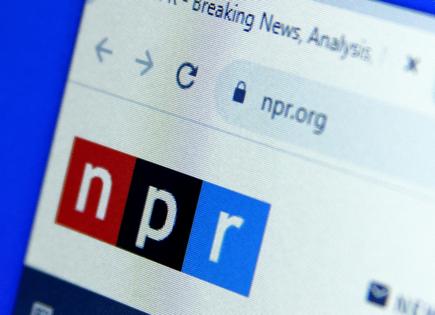Court battle likely over Trump's executive order to defund public broadcasting
Published in Political News
President Donald Trump issued a late-night executive order Thursday calling for an end to government dollars for the Corporation for Public Broadcasting, the taxpayer-backed entity that provides funding to public media outlets the president described as "left wing propaganda."
But Trump's ongoing effort to cut federal funding of public media outlets such as PBS and NPR already is facing stiff opposition.
The order is the latest attempt by Trump to limit or intimidate institutions he does not agree with, including law firms, universities and media companies such as CBS, which is being sued for $20 billion over a "60 Minutes" interview with former Vice President Kamala Harris during the 2024 presidential campaign.
The CPB immediately fired back Friday, with a statement asserting that the president does not have the power to cut off its funding — Congress does.
"Congress directly authorized and funded CPB to be a private nonprofit corporation wholly independent of the federal government," the CPB said in a statement.
The White House is likely aware of that fact as it reportedly is expected to go to Congress with a formal request to claw back the $1.1 billion currently allocated for the CPB over the next two years.
But the president's executive order will not help if the White House is taken to court over the issue, which appears likely.
A representative for the CPB did not comment on whether it will pursue legal action, but PBS President Paula Kerger said in a statement that the service is "exploring all options."
"The president's blatantly unlawful Executive Order, issued in the middle of the night, threatens our ability to serve the American public with educational programming, as we have for the past 50-plus years," Kerger said.
NPR Chief Executive Katherine Maher said, "We will challenge this Executive Order using all means available." She called Trump's order "an affront to the First Amendment rights of NPR and locally owned and operated stations throughout America to produce and air programming that meets the needs of their communities."
Both executives were pounded by Republican legislators in March at a hearing in the Capitol where a large photo of drag queen Lil Miss Hot Mess appearing on a PBS kids show was displayed behind committee chair Rep. Marjorie Taylor Greene, R-Ga.
Jeffrey McCall, professor of communication at DePauw University, said there is a case to be made that government funding of public radio and TV outlets needs to be revisited as the media landscape provides a wide array of information sources that didn't exist when the CPB was founded in the 1960s. Instead, the White House is "shooting itself in the foot" with political attacks.
"If they go to court over the issue, the first thing CPB lawyers are going to say is this is viewpoint discrimination and they will probably be right," McCall said. "The way the Trump administration is going about this is a little clumsy because they are making this a political football."
One reason for forming the CPB in the late 1960s was to prevent the government from using funding to exert editorial control over programming.
The president's announcement of the executive order — titled "President Trump Finally Ends the Madness of NPR, PBS" — came with a litany of stories described as "examples of the trash that has passed for 'news.'"
The examples included an NPR story on eating human placentas, a practice that has been around for decades, and a 2017 documentary about a transgender teen on PBS.
If the battle goes to Congress, public media could have the upper hand. As NPR and PBS executives have often pointed out, most of the CPB funding goes to local public radio and TV stations that are often the lone sources of journalism in their communities.
PBS cites data that show 58% of all TV households tune into one of its member stations over the course of a year and that 60% of its audience lives in rural communities.
While the internet is cited as a reason to end public media funding, PBS noted that its programming is viewed in 87% of non-internet homes and 56% of low-income households.
Republican politicians in red states who don't get a lot of face time on Fox News like having local outlets where they can reach their constituents. Such thinking has helped preserve public media funding in the past.
While Los Angeles outlets have a larger population to draw on for financial support from listeners and local underwriters, the loss of federal dollars would be significant.
_____
(Los Angeles Times staff writer James Rainey contributed to this report.)
_____
©2025 Los Angeles Times. Visit latimes.com. Distributed by Tribune Content Agency, LLC.




























































Comments